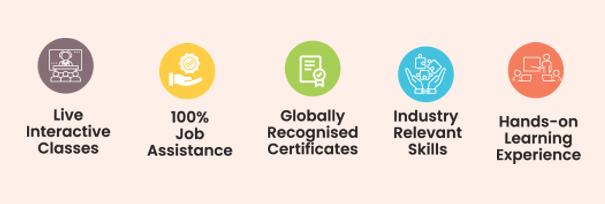Are you planning to leverage the benefits of growing software development and machine learning hype in the technical and digital landscape? Or, are you searching for lucrative career options that align with the growing demands of the technological industry? If yes, then this blog has details for you! And for those wondering, only tech-savvy can benefit from this blog, not necessarily, as both DevOps and MLOps, which we will be discussing below, cater to both interests!
In the sections below, we will take you to the details of DevOps and MLOps, exploring the hype for the jobs, differences, similarities and benefits of opting for the options. So, scroll down to know more!
About DevOps –
DevOps (Development and Operations) are the concepts that combine the working of software development and operations, aiming to provide a collaborative approach to performing development and IT operations team tasks together. More than just an approach, it is a culture that facilitates and encourages better communication between two different departments, shortening the software development process, which includes –
- Production,
- Operation,
- Testing,
- Design.
Key principles of DevOps include iteration, automation, continuous improvement, collaboration, continuous testing, and self-service, which further serve faster new launches, increased satisfaction of developers and customers, and better feedback loops.
About MLOps –
MLOps is another buzzed word for Machine Learning Operations. It is a set of practices that facilitates the process of machine learning into production, combining the practices of machine learning development and IT operations. All the tasks in MLOps facilitate consistent and efficient deployment and maintenance of machine learning models, combining ML with CI/CD (continuous integration and continuous delivery) practices associated with DevOps.
Machine Learning Operations use various technologies and tools to automate the workflow, including –
- Continuous Integration – Automation testing, packaging and building of the AI models.
- Version Control Systems – For tracking changes in data, models and codes.
- Model Monitoring Tools – To monitor the health and performance of machine learning models in production.
- Model Management Tools – Manage and track multiple machine learning model versions.
- Continuous Delivery – Automate ML model deployment to production environments.
Difference in DevOps and MLOps –
Although MLOps is quite similar to DevOps, the technology specifically tailors to the unique machine learning challenges in the project.
|
Code |
Roles |
Artifact |
Validation |
|
|
MLOps |
Develop a model to feed the inferences and have a broad scope of libraries and languages. |
Machine Learning Engineers, Data Scientists |
Seriolised files. |
Model Performace (Error rate) |
|
DevOps |
It is used to develop a generic application with a standard library set for specific use cases. |
DevOps Engineers, Software Engineers. |
Executable JAR. |
Unit testing |
For all those searching for the list of differences between DevOps and MLOps, the section below has details for your queries regarding all the key differences –
Version Control
MLOps –
- MLOps pipelines are facilitated with more tracking factors, including model-building codes, training databases and model artefacts.
- Training and building ML models involve tracking multiple metrics, iterative experimentation cycles, and components for each experiment, which are required for later audits.
- These metrics include model performance indicators, hyperparameters, and error rates.
DevOps –
- Version control offers only a few tracking metrics, including code and artifacts changes.
Development
MLOps –
- Coding allows teams to train or build machine-learning models, and the output artifacts include the serialised file, receiving data inputs for generating inferences.
- Validation is done to check the performance of trained models according to test data, and this cycle continues until the model reaches the peak performance threshold.
DevOps –
- The code usually creates an application and interface and is wrapped into an artifact or executable JAR before being tested or deployed with checks.
- The automation cycle continues until the final product is tested and ready.
Continuous Monitoring –
Continuous monitoring for both DevOps and MLOps is required, but for different reasons, which include –
MLOps –
- Since there are more chances of degradation, constant updating and monitoring are required.
- Changing conditions in a production environment affect the accuracy of the models. Therefore, after deployment to production, the model generates predictions on the new data, which constantly changes, reducing the ML model performance.
- MLOps working ensures that the algorithms are ready for production with incorporated continuous monitoring and retraining procedures.
DevOps –
- SRE (Site Reliability Engineering), which has been trading for the past few years, emphasises the need for software monitoring through production deployment from development. However, the software monitoring does not degrade its working as ML does.
Reusability–
MLOps –
- MLOps pipeline applies the repeated workflow, as the standard framework across different projects improves consistency while allowing teams to progress faster due to familiarity,
- The structure is a part of the project template, enabling customisation to address each project’s unique requirements.
- MLOps has centralised data management for the organisation’s data consolidation, accelerating the training and discovery process. Furthermore, data warehouses and sources of truth are the common approach to centralisation.
DevOps –
- DevOps pipelines work on repeatable processes, allowing the team to mix and match the process without following any specific flow.
Infrastructure –
Relying intensely on the cloud technology, both DevOps and MLOps have different operational requirements.
MLOps –
- Relies on cloud storage for storing extensive datasets, machine learning and deep learning frameworks, computationally intensive ML models and GPUs for deep learning.
MLOps –
- Relies on CD/CI automation tools, IaC (Infrastructure-as-code) and build servers.
Apart from the mentioned differences, a reader must be aware of some other details:
- DevOps is more inclined to work on processes and tools to automate the deployment and development process. In contrast, MLOps focuses on using data insights for better business decisions.
- Model testing, training and validation are relevant for MLOps but not of any use for DevOps.
- DevOps focuses more on traditional software development tasks like code deployments or builds, whereas MLOps focuses more on automating machine learning tasks, like training models.
Similarities in DevOps and MLOps –
#1 – Both Work on Streamlining –
MLOps and DevOps are both streamlining processes. MLOps streamlines the life cycle of machine learning from start to end, aiming to bridge the gap between model development, operations and designs, reducing the turnout times in machine learning development. DevOps, conversely, combines software development’s testing, operational and development aspects, aiming to turn these isolated processes into continuous sets in an organisation.
#2 – All About Communication –
DevOps and MLOps demand clear communication for automation, feedback loops, continuous delivery, and smooth cooperation between departments, system administrators, and data science teams, which facilitates a common understanding of the development and maintenance of production models.
Final Takeaway -
From the above discussion, you may have clarity about the difference between DevOps and MLOps, along with the similarities. DevOps works for software development and operations, whereas MLOps is dedicated to machine learning deployment. MLOps is a subset of DevOps, and DevOps is the basic requirement for the foundation of MLOps practices.
Furthermore, both skills offer job scope in various roles, including DevOps engineer, MLOps engineer, Site reliability engineer, cloud engineer, data engineer, and many others. According to a report, the average annual salary for a DevOps engineer is around INR 7.4 Lakhs, and for MLOP engineers, the same is INR 12,00,000.
If you also want to secure a high-paying job as a DevOps or MLOps engineer. IT experts at Grras Solutions have the best list of IT courses for you, all curated and led by industry experts. Whether you’re in Jaipur, Delhi, Ahmedabad, Lucknow, Nagpur or Nasik, Grras Solution is the ultimate destination for you for IT courses, offering a 100% job-placement guarantee to each student.
What are you still waiting for? Connect with the IT experts at Grras Solutions and learn more!






